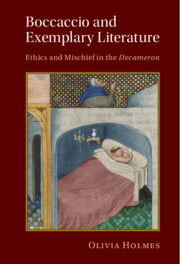Book contents
- Boccaccio and Exemplary Literature
- Cambridge Studies in Medieval Literature
- Boccaccio and Exemplary Literature
- Copyright page
- Epigraph
- Contents
- Acknowledgments
- Introduction
- Chapter 1 Ethical Fables and Antifeminist Exempla
- Chapter 2 From Sermon Story to Novella
- Chapter 3 Lives of Saints; Lives of Sinners
- Chapter 4 Classical and Vernacular Exempla
- Chapter 5 Magister Amoris
- Afterword in Time of Plague
- Notes
- Bibliography
- Index
- Cambridge Studies in Medieval Literature
Chapter 3 - Lives of Saints; Lives of Sinners
Published online by Cambridge University Press: 02 February 2023
- Boccaccio and Exemplary Literature
- Cambridge Studies in Medieval Literature
- Boccaccio and Exemplary Literature
- Copyright page
- Epigraph
- Contents
- Acknowledgments
- Introduction
- Chapter 1 Ethical Fables and Antifeminist Exempla
- Chapter 2 From Sermon Story to Novella
- Chapter 3 Lives of Saints; Lives of Sinners
- Chapter 4 Classical and Vernacular Exempla
- Chapter 5 Magister Amoris
- Afterword in Time of Plague
- Notes
- Bibliography
- Index
- Cambridge Studies in Medieval Literature
Summary
Chapter 3 explores medieval hagiographic collections, including Iacopo da Varazze’s Legenda aurea and Domenico Cavalca’s Vite dei santi padri. By adopting conventional narratives – of young men who squander their wealth, cross-dressing female saints, and ascetics tempted by demons – but charging them with new messages, Boccaccio interrogates the nature of exemplarity and the possibility of generalizing from experience. This chapter briefly discusses Decameron 1.1, then turns to individual tales (such as 3.10) that combine details from different narratives, as well as to pairs of tales (such as 2.3 and 2.9) that manipulate elements from one saint’s life in different ways. The chapter concludes by examining Boccaccio’s reprisal of apologues embedded in the Legend of Saints Barlaam and Josaphat – a Christianized version of the life of the Buddha – especially in the partial novella recounted at the opening of Day 4 and in the final novella.
Keywords
- Type
- Chapter
- Information
- Boccaccio and Exemplary LiteratureEthics and Mischief in the <i>Decameron</i>, pp. 94 - 145Publisher: Cambridge University PressPrint publication year: 2023

